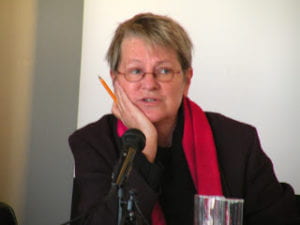by Gina Elbert
 Introduction to Postcolonial Studies: Post-Apartheid South African Literature is no ordinary English class. Led by Professor Isabel Hofmeyr, who is currently visiting NYU from the University of Witwatersrand, Johannesburg, its syllabus includes canonical South African authors like J.M. Coetzee and Zakes Mda alongside younger, newer authors like Gabeba Baderoon and Lauren Beukes. That may not be extraordinary in itself, but continue reading: she also assigns videos of comedy routines, articles like Zanele Muholi’s “My Year as a Dark Lioness – in pictures,” and the Rhodes Must Fall movement-centered poem “The Black Imagination.”
Introduction to Postcolonial Studies: Post-Apartheid South African Literature is no ordinary English class. Led by Professor Isabel Hofmeyr, who is currently visiting NYU from the University of Witwatersrand, Johannesburg, its syllabus includes canonical South African authors like J.M. Coetzee and Zakes Mda alongside younger, newer authors like Gabeba Baderoon and Lauren Beukes. That may not be extraordinary in itself, but continue reading: she also assigns videos of comedy routines, articles like Zanele Muholi’s “My Year as a Dark Lioness – in pictures,” and the Rhodes Must Fall movement-centered poem “The Black Imagination.”
The class has also added academic interviews to the list of genres it explores. Throughout the semester, students have been given the opportunity to speak with South African authors via Skype link-ups every few weeks. On November 1st, students spoke to academic and feminist poet Gabeba Baderoon, author of collections like The Silence Before Speaking, closely followed by novelist, short story writer, and former student of Professur Hofmeyr, Niq Mhlongo, on November 8th and novelist Henrietta Rose-Innes on November 29th. Discussion topics range from multilingualism (“How does multilingualism affect poetry?”) and issues in translation (“How do you translate the self?) to specific thematic or academic issues (“How do we upend Western academic influence colonizing scholarly development?) and the process of writing (“What is the difference between the author and the narrator?”).
This level of communication is rarely seen between students and the authors they study in their class. People on both ends of the conversation benefit from it: authors are able to explain their ideas and raise awareness of the history behind their stories, while students gain insight into issues in South African politics and society. Ellen Cooper, a senior major in Comparative Literature, told me that she was even able to take advantage of the interviews as research for her honors thesis. She said, “I asked Gabeba Baderoon if she was inspired by the work of Carribean authors (whom I’m writing about for my honors thesis), and we had a fruitful discussion about the similarities between Carribean and South African culture that helped me think about my thesis in a new way.”
Outside of the Contemporary Literature Series Lab, which itself is only offered once a year, it is rare to find such a high level of engagement between students and contemporary authors in the classroom. Most of the people in the class began the semester with little knowledge of South African literature, but after studying its many different aspects, that is no longer the case. Professor Hofmeyr’s class stands on its own in providing students with opportunities to speak to multiple international authors using advanced technology.